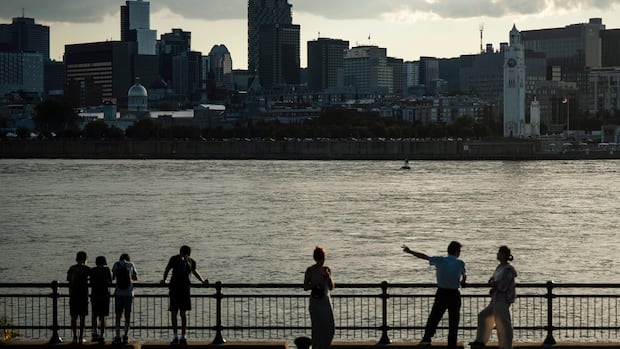Valérie Plante, Montreal’s outgoing mayor, has repeatedly called on higher levels of government to help tackle the city’s most pressing issues, from homelessness to expanding its public transit network.
Earlier this week, she also pressed the federal government to give more money for another big challenge: helping cities adapt to climate change.
But what can the city itself actually do?
As citizens prepare to vote in the Nov. 2 municipal elections, experts say the next municipal leader in Montreal and across Quebec will need to build alliances with other levels of government — and use the tools they have.
Who does what
On a daily basis, residents in Montreal and across Canada rely on their municipality to provide basic services, from the water that comes out of their tap and road maintenance to snow removal and garbage pickup.
Municipalities are not responsible for health care, education, immigration and much of the policies that help determine the cost of housing.
Local elected officials, however, are also trying to deal with more complex problems like homelessness and a rise in drug overdoses, a lack of affordable housing and expanding the public transit network.
Rebecca Bligh, president of the Federation of Canadian Municipalities (FCM) and a Vancouver city councillor, said municipalities are “shouldering many of the costs” associated with housing, homelessness and public safety.
“They’re dealing with a whole host of other challenges related to what might typically be the responsibility of senior levels of government,” she said in an interview.
Funding limitations
In Canada, property taxes are the main source of funding for municipalities, whereas the federal and provincial governments draw on a much larger revenue pool, including income tax and sales tax.
Municipalities manage and maintain more than 60 per cent of Canada’s public infrastructure, yet receive only between eight and 10 cents of each tax dollar collected across all levels of government, according to the FCM.
The FCM argues the funding model for municipalities is outdated, given the demands facing cities like Montreal.
Bligh’s organization is calling for an increase in the annual transfers from the federal government to municipalities by $2.6 billion, bringing the total to $5 billion.
“The fiscal framework that municipalities are charged with is from another time,” she said.
Every day, even if you don’t own a home or even leave the house, you’re relying on city services. Who you elect will determine what gets prioritized.
Cross-governmental issues
Danielle Pilette, a professor who specializes in municipal affairs in the urban studies department at the Université du Québec à Montréal, said cities like Montreal don’t have “means or authority to handle very complicated situations, like the housing crisis.”
She added: “It’s not just Montreal — it’s the same in other provinces. Cities are creatures of the provinces; federal money must go through the provinces first, which adds layers of delay and uncertainty.”
Problems like homelessness won’t be solved, she said, “until there’s better co-ordination between all the levels of government, and the municipalities themselves.
“Currently, social services are duplicated across provincial and municipal levels,” she said.
Zoning, local solutions and being a ‘good advocate’
Alison Smith, an associate professor at University of Toronto, has studied municipal governance and the response to the homelessness crisis across the country. She too said these big challenges cities face require “all levels of government.”
Under the current model, much of it comes down to an ability to work with other levels of government, said Smith.
“Part of it comes down to being a good advocate,” she said.
Local governments, she said, have “so much expertise, so much knowledge of local groups, local solutions, and there’s lots of cases across the country where local governments have partnered with community groups.”
One recent example of success, Smith said, is the Old Brewery Mission, the city’s largest homeless shelter.
James Hughes, the mission’s executive director, said there’s a lot the city can do despite the division of powers between municipal, provincial and federal governments.
“They have the powers of zoning and regulation to ensure that projects can advance and the speed at which they advance is often in the hands of the cities,” he said.
Earlier this week, the city announced a modular housing project at the old Hippodrome site in the Côte-des-Neiges–Notre-Dame-de-Grâce borough.
All three levels of government, along with the mission, were involved.
While public security is already a major issue in Montreal’s municipal election race, with dramatic growth in the city’s unhoused population in recent years, at least one party looks to be highlighting it even more with a major spending promise.
Who gets a say
Municipal elections tend to get a low turnout. In Quebec’s 2021 municipal elections, only 38 per cent of eligible voters cast a ballot.
By comparison, 69 per cent voted in the federal election earlier this year.
Bligh said it’s on municipal candidates to demonstrate the importance of voting — and choosing the right candidate.
“Whether it’s housing, whether it’s homelessness or a mental health challenge — we get the emails, we see these residents in the grocery stores, in the arenas,” she said.
“These are our neighbours.”








